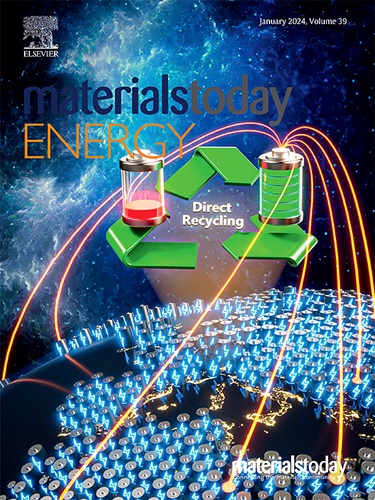Magnetic field-augmented photoelectrochemical water splitting in Co3O4 and NiO nanorod arrays
IF 8.6
2区 材料科学
Q1 CHEMISTRY, PHYSICAL
引用次数: 0
Abstract
Effective charge separation is crucial for improving the sensitivity of photoelectrochemical studies. Here, we provide an immense magnetic field-based electron spin polarization approach for an efficient charge carrier separation. We have fabricated NiO and CoO thin film and nanorod arrays by electron beam evaporation glancing angle method followed by annealing in a two-zone furnace. The photoelectrochemical performance was investigated for NiO and CoO samples in the presence and absence of a magnetic field. The NiO and CoO nanorods array samples exhibit better absorption compared with the thin film samples. The CoO and NiO nanorod arrays showed the highest photocurrent density of 0.12 and 0.55 mA/cm in a magnetic field. The superior photoelectrochemical response of NiO and CoO nanorods in a magnetic field could be ascribed to the limitation of non-radiative recombination of carriers manipulated by Lorentz force and spin polarization. Furthermore, the electrochemical impedance spectra of NiO and CoO nanorod arrays in a magnetic field show the least charge transfer resistance. This study sheds light on the interaction process between external fields and radiative/non-radiative recombination of manipulating carriers. Thus, the application of a magnetic field presents an efficient and versatile approach to enhance the performance of photoelectrodes in solar water splitting.Co3O4 和 NiO 纳米棒阵列中的磁场增强型光电化学分水技术
有效的电荷分离对于提高光电化学研究的灵敏度至关重要。在此,我们提供了一种基于巨大磁场的电子自旋极化方法,以实现高效的电荷载流子分离。我们采用电子束蒸发闪烁角法制备了氧化镍和氧化钴薄膜及纳米棒阵列,然后在双区炉中进行退火。我们研究了有磁场和无磁场条件下氧化镍和氧化钴样品的光电化学性能。与薄膜样品相比,NiO 和 CoO 纳米棒阵列样品表现出更好的吸收性。CoO 和 NiO 纳米棒阵列在磁场中的光电流密度最高,分别为 0.12 和 0.55 mA/cm。NiO 和 CoO 纳米棒在磁场中的卓越光电化学响应可归因于洛伦兹力和自旋极化对载流子非辐射重组的限制。此外,NiO 和 CoO 纳米棒阵列在磁场中的电化学阻抗谱显示出最小的电荷转移电阻。这项研究揭示了外部磁场与操纵载流子的辐射/非辐射重组之间的相互作用过程。因此,磁场的应用为提高光电极在太阳能水分离中的性能提供了一种高效、多用途的方法。
本文章由计算机程序翻译,如有差异,请以英文原文为准。
求助全文
约1分钟内获得全文
求助全文
来源期刊

Materials Today Energy
Materials Science-Materials Science (miscellaneous)
CiteScore
15.10
自引率
7.50%
发文量
291
审稿时长
15 days
期刊介绍:
Materials Today Energy is a multi-disciplinary, rapid-publication journal focused on all aspects of materials for energy.
Materials Today Energy provides a forum for the discussion of high quality research that is helping define the inclusive, growing field of energy materials.
Part of the Materials Today family, Materials Today Energy offers authors rigorous peer review, rapid decisions, and high visibility. The editors welcome comprehensive articles, short communications and reviews on both theoretical and experimental work in relation to energy harvesting, conversion, storage and distribution, on topics including but not limited to:
-Solar energy conversion
-Hydrogen generation
-Photocatalysis
-Thermoelectric materials and devices
-Materials for nuclear energy applications
-Materials for Energy Storage
-Environment protection
-Sustainable and green materials
 求助内容:
求助内容: 应助结果提醒方式:
应助结果提醒方式:


